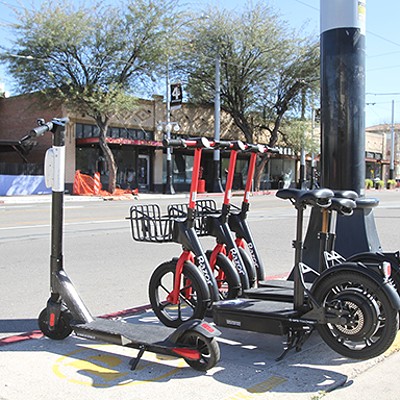PLAGUED BY CHRONIC deficits in its bus system and lingering potholes in neighborhood streets, the City Council is flirting with a half-cent sales tax increase. This kind of finance scheme has been dreaded and rejected by Pima County voters three times in the past few years, a trend halted only by the narrow passage last month of a .06-percent sales tax for the state's schools.
Councilman Jerry Anderson, a first-term Democrat from northside Ward 3, ushered in the new talk of a sales tax primarily as a subsidy for the Sun Tran transit system.
But the council, which is expected early next year to consider placing the half-cent sales tax question on the 2001 ballot, now is aiming at several spending targets.
"Some want it just for transit," said freshman council member Carol West of northeast Ward 2. "I'd like to see it broadened to include roads. We have neighborhood roads that have not been resurfaced in 50 years. Some others want to see it broadened to include roads and for our Back to Basics program."
Still, West is cautious, given voters' animosity toward proposed sales taxes, including two for transportation improvements, in the past 14 years. And she says the vote to approve the sales tax for education should not lift any one's caution.
"That's something that I think a lot about. The education tax deserved to pass but I'm still kind of mad at the Legislature for not biting the bullet and paying for our education needs some other way," West said.
And constituents call regularly, West said, protesting that taxes are already too high.
Indeed. The sales tax for education, a solidly popular issue, narrowly passed in Pima County despite losing in a majority of precincts in the districts of three members of the Board of Supervisors. And in the city, support for the .06-percent sales tax was unsteady; the measure lost in a majority of precincts in West's ward as well as in southeast Ward 4 and south side Ward 2. It carried heavily only in Republican Fred Ronstadt's midtown Ward 6.
For West, elected last year to replace her former boss, Janet Marcus, the sales tax is tricky. The education-funding measure on the November 7 ballot failed in her ward precincts by 3 to 2. It only got worse in the fiscally conservative southeast side Ward 4, represented by two-term Democrat Shirley Scott. There, the education sales tax was crushed by a precinct margin of 7 to 1.
And for county supervisors, the measure failed in south side District 2, northwest and rural District 3 and in District 4, which covers the east side and Green Valley, the retirement haven that voted down the education sales tax in each of its 14 precincts.
It failed in the home precincts of District 2 Democratic Supervisor Dan Eckstrom and in District 3 Democratic board chairman Sharon Bronson. The tax-for-education vote ended in a tie in District 5 Democrat Raúl Grijalva's home precinct.
Such margins are reminiscent of Pima County's blundering sales tax experiences. A half-cent for major road building and expansion was defeated in 1986, with a combination of anti-tax fervor and environmentalism, by 57 percent of voters.
Four years later, then City Council member George Miller, the Democrat who went on to serve two terms as mayor, championed a restyled transportation package that gave much more to buses, bike paths and sidewalks. But that package, again attached to a half-cent sales tax, was crushed by 61 percent of the voters.
And in the county's final sales tax foray, 70 percent of the voters in 1994 smashed a proposal that called for a quarter-cent increase to pay for new juvenile detention facilities and expansion of the main jail.
Yet it wasn't necessarily the projects that turned people off. Three years ago, voters agreed to pay for the juvenile center and more jail space through property taxes, and for new roads through new gas taxes. And supervisors increased property taxes by 16 percent in three of the last four years to record levels.
Property taxes are one thing, but voters seemingly enjoy life with no county sales tax. They don't get off so easily in the municipalities. Sales taxes, which exempt grocery food and medicine, are 2 percent in the city, Oro Valley and Marana. They are highest in South Tucson, with 2.5 percent on retail sales and 3.5 percent in restaurants. Outside the municipalities, only the state assesses a sales tax, which will now increase from a nickel per dollar to 5.6 cents per dollar.
Tom Volgy, a Democrat, was the mayor of Tucson in 1990 when a sales tax and transportation plan failed. Four years earlier, Volgy had represented Tucson's Ward 6 when the county's road plan and sales tax crashed.
"Several factors converge," Volgy said, "for voters on the sales tax question and the facilities and services they are to fund." First is the voters' perception of how great the need is, and second is the voters' perception of the competence of the government seeking the money. "If there is only one of those, it is not likely that voters will approve (the tax)," Volgy said.
Then there is the issue--one that Volgy calls "hidden"--of how well the campaign is run in support of the tax: "It's not just who, but how." And even in the "who" category, Volgy says, there must be diverse community leadership, as there was for the sales tax for education.
What elected leaders and their bureaucrats must also keep in mind is the perception of the economy. The wave of economic good times, Volgy said, did not hit Tucson until well after the three failed sales tax proposals were put before voters. That could explain at least part of the success the bond project for jails and roads scored in 1997 after getting trounced in separate votes earlier in the decade.
Moreover, despite some "pockets otherwise," Tucson still is a poor city, Volgy said, and, nationally, talk of recession and of the government scaling back earlier revenue projections is prevalent.
The state's education sales tax was successful because voters "responded to the need and it was pretty clear where the money was going," Volgy said. "There's not likely to be waste."
The education sales tax passed in City Council member Steve Leal's neighborhood precinct, but lost in a majority of his other Ward 5 precincts. So he, like West, is cautious about a new city sales tax for transit.
Now, the success of the education tax "may make it harder" to get another tax passed, Leal said.
And he said the measure must fund a "composition of things," including transit, road improvement and neighborhood improvements.
"The existing neighborhoods have been paying for roads on the periphery while all they've been getting is schlock chip seal that lasts about a week and gives you cracked windshields," Leal said.
And on the issue of Sun Tran, Leal said, more emphasis must be placed on the fare box on all routes. While the average fare represents 25 percent of cost, Leal said there needs to be a minimum fare for all routes.
"We had one route that was costing us $13.82 per rider per mile," Leal said. "That's got to stop. Why didn't we just hire a cab to pick people up at the door?"
Moreover, Leal said, southside riders appear to be subsidizing the more far-flung eastside routes.
All of this--transportation improvements and funding as well as garbage budgets and levels of service--will be explored in budget workshops that West and Anderson have pushed to be held in January.
"Before we put anything on the ballot, we need a whole lot of community meetings on transportation just like we need on garbage service," West said. "I mean really go out and beat the bushes. If we don't do that, then it deserves to fail."
Volgy agrees with West, saying it would be "foolish" for any government to first identify a desired tax without getting agreement on what the tax will fund. Transportation has been particularly vexing.
"A plan that could win support for a sales tax must be, if not embraced by all sides, at least capable of bringing compromise," Volgy said.
Neither side--road proponents nor transit backers--can win on its own terms, Volgy said.











